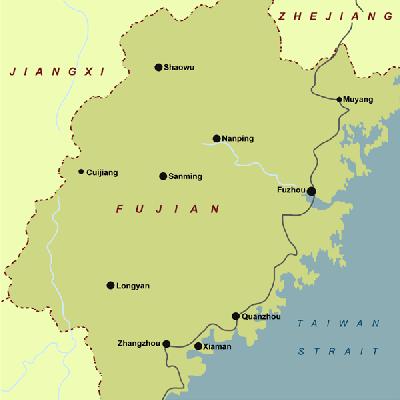| Map |
|
|
Fujian
Fujian has a sub-tropical climate, warm and humid, with no distinctive difference between seasons. It has a mean annual temperature of 17oC-21oC, and a mean annual precipitation of 1,200-2,200 mm. Typhoons occur frequently from May to November.
It is divided into 9 prefecture-level cities, 14 county-level cities and 46 counties, with a population of 34.71 million by 2000.
Min Cuisine (Fujian Cuisine) is one of the Eight Great Cuisines in China, emphasizing seafood, river fish, and shrimp. The most characteristic aspect of Fujian Cuisine is that its dishes are served in soup.
Pear Orchard Opera, Puppet Show, etc.
The main traditional specialties are the Oolong Tea, orange of Zhangzhou, longan of Jinjiang, lacquer ware of Fuzhou, porcelain of Dehua, stone carving of Shoushan and woodcarving of Quanzhou.
Fujian Province (Min for short) is located on the southeast coast of China, with Fuzhou as the provincial capital. Fujian is also the home of many overseas Chinese.
Fujian has well-developed agriculture, forestry and fishery. Its mild, humid, subtropical and marine climate is especially conducive to crop production. Sugarcane, peanuts, tea, tobacco, rubber, jute and bluish dogbane are Fujian's major cash crops. Orange, longan, lichi, pineapple, loquat and banana are the six famous fruits of Fujian. Its industries of building materials, forest, light industry, electronics, chemical, machinery, and papermaking occupy important places in the country.
Fujian is blessed with a rich history, famous historical sites and beautiful natural landscapes, making it a unique tourist attraction. Its numerous tourist attractions include mountains, rivers and well-known cities. Quanzhou, one of China's famous historic and cultural ancient cities, is a human and scenic spot approved by the UNESCO; Xiamen, known as the "Garden on the Sea", is a picturesque special economic zone; Wuyi Mountain, inscribed on the World Heritage List, is famous for its peaks and Wuyi tea; the Kaiyuan Temple in Quanzhou, the Yongquan Temple in Fuzhou, the Guanghua Temple in Putian and the Nanshan Temple in Zhangzhou are the four famous grand ancient temples in Fujian. In addition, there are historical relics left behind by Zhu Xi and Zheng Chenggong. |
||||
 |
 Geography
Geography
 Climate
Climate Administrative Division and
Population
Administrative Division and
Population Food
Food  Culture
Culture  Special Local Products
Special Local Products Brief Introduction
Brief Introduction